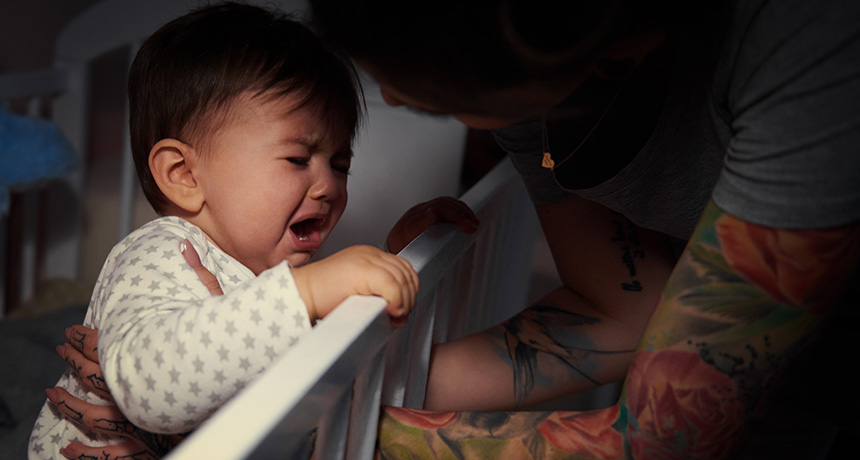When should babies sleep in their own rooms?

When we brought our first baby home from the hospital, our pediatrician advised us to have her sleep in our room. We put our tiny new roommate in a crib near our bed (though other containers that were flat, firm and free of blankets, pillows or stuffed animals would have worked, too).
The advice aims to reduce the risk of sleep-related deaths, including sudden infant death syndrome, or SIDS. Studies suggest that in their first year of life, babies who bunk with their parents (but not in the same bed) are less likely to die from SIDS than babies who sleep in their own room. The reasons aren’t clear, but scientists suspect it has to do with lighter sleep: Babies who sleep near parents might more readily wake themselves up and avoid the deep sleep that’s a risk factor for SIDS.
That’s an important reason to keep babies close. Room sharing also makes sense from a logistical standpoint. Middle of the night feedings and diaper changes are easier when there’s less distance between you and the babe.
But babies get older. They start snoring a little louder and eating less frequently, and it’s quite natural to wonder how long this room sharing should last. That’s a question without a great answer. In November 2016, the American Academy of Pediatrics task force on SIDS updated its sleep guidelines. The earlier recommendation was that babies ought to sleep in parents’ bedrooms for an entire year. The new suggestion softens that a bit to say infants should be there for “ideally for the first year of life, but at least for the first 6 months.”
Rachel Moon, a SIDS expert at the University of Virginia in Charlottesville who helped write the revised AAP guidelines, says that the update “gives parents a little more latitude after the first 6 months.” The vast majority of SIDS deaths happen in the first six months of life, but the studies that have found benefits for room sharing lumped together data from the entire first year. That makes it hard to say how protective room sharing is for babies between 6 and 12 months of age.
But a new study raises a reason why babies ought to get evicted before their first birthday: They may get more sleep at night in their own rooms. Babies who were sleeping in their own rooms at ages 4 or 9 months got more nighttime sleep than babies the same ages who roomed with parents, researchers reported online June 5 in Pediatrics.
The team asked hundreds of mothers to take sleep surveys when their children were 4, 9, 12 and 30 months old. Some of the 230 children slept in their own rooms when they were younger than 4 months, others moved to their own rooms between 4 and 9 months, and the rest were still sharing their parents’ rooms at 9 months.
At 9 months, babies who had been sleeping alone since 4 months of age slept an average of 40 minutes more than room sharers. The researchers found no differences in sleep duration between the groups of babies at age 12 months. By 30 months of age, though, children who had been sleeping in their own rooms by either 4 or 9 months of age slept on average 45 minutes longer at night than children who had been sharing their parents’ rooms at 9 months. (Important caveat: At 30 months, total daily sleep time didn’t differ between the groups. The former room sharers were making up for missed nighttime sleep with naps.)
Parents who want their babies age 6 months and older to sleep in their own room ought to be encouraged to make the move, says study coauthor Ian Paul, a pediatrician at Penn State. “The guidelines should reflect data, not opinion,” Paul says.
He suspects that sharing a bedroom with babies interferes with everyone’s sleep because normal nocturnal rustlings turn into full-blown wake-ups. Babies and adults alike experience brief arousals during sleep. But when parents are right next to babies, they’re more likely to respond to their children’s brief arousals, which then wakes the baby up more. “This then sets up the expectation from the baby that these arousals will be met with a parent reaction, causing a bad cycle to develop,” he says.
There was another difference that turned up between the two groups of babies. Babies who roomed with parents were four times more likely to be moved into their parents’ beds at some point during the night than babies who slept in their own rooms. Bed sharing is a big risk factor for sleep-related infant deaths.
But Moon cautions that the Pediatrics study is preliminary, and doesn’t warrant a change in the AAP guidelines. She and coauthors point out in an accompanying commentary that other factors might be behind the difference in sleep between the two groups of babies. For instance, babies who slept in their own room were more likely to have consistent bedtime routines, be put to bed drowsy but awake, and have bedtimes of 8 p.m. or earlier. Those are all signs of good “sleep hygiene” for babies, and might be contributing to the longer sleep times. “We know that consistent bedtime routine and consistent bedtime are very important in terms of sleep quality in children,” Moon says. “They could very well make a difference.”
So that’s where we are. Some things are clear, like putting your baby to sleep on her back on a flat, firm surface clear of objects and having your baby nearby during the first six months. But other decisions come with skimpier science, and whether to evict your 6-month-old is one of them. Because science can take you only so far, it may just come down to the snoring, stirring and sleep deprivation.